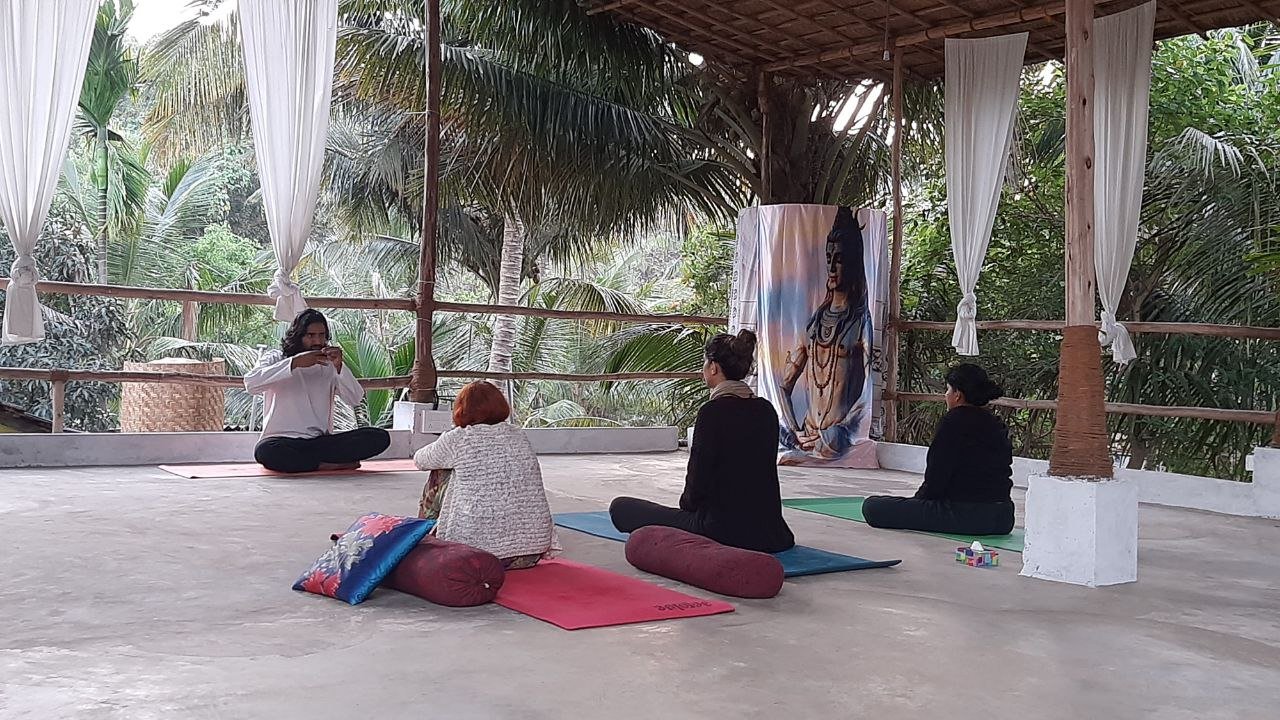Two ancient sciences from India often join forces as Yoga and Ayurveda to help people discover balanced holistic lifestyles while cultivating mindfulness. Yoga deals with a tripartite system of physical health and mental well-being and spiritual aspects yet Ayurveda provides “science of life” therapeutic methods which use diet and herbal medicine alongside behavioural regimens for holistic balance maintenance. These methodologies derive from common philosophical fundamentals which enhances their partnership as wellness partners.
This article describes how yoga and Ayurveda form an interconnected practice system which creates balanced wellness when combined together. We will discuss the advantages of joining yoga and ayurveda retreat programs that unite teachings from each tradition.
Understanding Yoga and Ayurveda
Before diving into how these two practices complement each other, it’s important to understand what each tradition entails:
Yoga: Rooted in the ancient texts of the Vedas and Upanishads, yoga is a discipline that emphasizes physical postures (asanas), breath control (pranayama), meditation (dhyana), and ethical practices (yamas and niyamas). The goal of yoga is to cultivate union – the union of mind, body, and spirit, as well as the union of the individual self with the universal consciousness (Brahman). The physical postures and techniques of yoga are designed to purify the body, calm the mind, and elevate the spirit.
Ayurveda: Ayurveda, a traditional system of medicine dating back thousands of years, seeks to maintain harmony in the body and mind by balancing the three primary energies or doshas – Vata, Pitta, and Kapha. Each dosha represents specific physical and mental qualities, and every individual has a unique constitution made up of varying dosha combinations. Ayurveda offers personalised recommendations regarding diet, lifestyle, herbal remedies, and daily practices to maintain optimal health. The ultimate goal is to achieve balance and harmony within the body and mind, preventing disease and promoting longevity.
The Connection Between Yoga and Ayurveda
At their core, both yoga and Ayurveda are rooted in the idea of balance and well-being. By understanding how these two practices intersect, you can maximise the benefits of your yoga practice and lead a more health-conscious life.
1. The Dosha System and Yoga
Ayurveda’s concept of doshas directly correlates with the physical and energetic aspects of yoga. Just as Ayurveda categorises individuals into unique dosha types, yoga can be tailored to support these doshas. The idea is to choose specific yoga practices, postures, and styles that help balance the dominant dosha in an individual.
Vata (Air and Ether): People with a dominant Vata dosha are often creative, energetic, and dynamic, but they may also experience anxiety, dryness, and irregularity in their daily rhythms. For Vata individuals, grounding, stabilizing, and calming practices in yoga are ideal. This includes slow-paced yoga styles like Hatha or Iyengar, along with long, gentle holds in postures, and focus on breathwork (pranayama). Asanas that emphasize standing postures and balancing poses, such as Tree Pose (Vrikshasana) and Warrior Pose (Virabhadrasana), are highly beneficial to stabilize Vata energy.
Pitta (Fire and Water): Pitta types are typically intense, determined, and strong, yet they may become easily irritated, overly competitive, or prone to inflammation. To balance Pitta, cooling, restorative yoga practices are recommended. Yin yoga, gentle Hatha, and practices that emphasize flexibility and relaxation (such as forward bends and backbends) can help soothe fiery Pitta energies. Meditation and deep breathwork also help calm the mind and reduce stress.
Kapha (Earth and Water): Those with a Kapha constitution are often calm, grounded, and nurturing, but they may also struggle with lethargy, excess weight, or congestion. Yoga practices that stimulate and invigorate are most beneficial for Kapha individuals. Fast-paced yoga styles like Vinyasa or Ashtanga can help energize the body and improve circulation. Poses such as twists, standing poses, and backbends promote movement and help combat stagnation.
By aligning your yoga practice with your individual dosha and its tendencies, you can enhance your physical, emotional, and mental well-being.
2. Ayurvedic Nutrition and Yoga
Diet plays a central role in Ayurveda, and what you eat can significantly influence your yoga practice. Ayurveda recommends specific foods and eating habits based on your dosha, the seasons, and your unique constitution.
For Vata: Warm, nourishing, and grounding foods such as soups, stews, and root vegetables are best for Vata types. To enhance a yoga practice, Vata individuals should aim to eat regular, balanced meals to avoid feeling scattered or fatigued.
For Pitta: Cooling foods such as fruits, salads, and dairy products are ideal for Pitta types. These foods help prevent overheating, inflammation, and irritability, which can interfere with yoga practices that require focus and concentration.
For Kapha: Light, stimulating foods such as greens, legumes, and spicy foods are great for Kapha types. These foods help to promote digestion and combat the sluggishness that can arise in individuals with a Kapha constitution.
By aligning your diet with Ayurvedic principles, you will improve your energy levels, mental clarity, and ability to engage deeply in your yoga practice.
3. Ayurvedic Herbs and Yoga
Ayurveda utilises a wide array of herbs to support health and vitality. Many herbs have properties that complement yoga practices by calming the mind, reducing stress, or increasing energy. For example:
Ashwagandha: Often called “Indian ginseng,” ashwagandha is an adaptogen that helps reduce stress and support energy. It can be especially beneficial for Vata types who tend to feel anxious or fatigued.
Turmeric: Known for its anti-inflammatory properties, turmeric can be used to reduce joint pain, making it a great herb for those practicing physically demanding yoga styles.
Brahmi: This herb enhances cognitive function and mental clarity, making it a great supplement for individuals who seek improved focus during meditation or pranayama.
Incorporating Ayurvedic herbs into your daily routine, under the guidance of an Ayurvedic practitioner, can further optimize your yoga practice.
Yoga and Ayurveda Retreats: A Holistic Approach to Wellness
The best way to discover the harmonious relationship between yoga and Ayurveda is through special retreats. These retreat facilities deliver intensive programs which help you learn detailed aspects between Ayurvedic healthcare and yoga practice. Here’s what you can expect from such retreats:
1. Personalized Ayurvedic Consultations
Ayurvedic retreats start with an evaluation of your dosha alignment followed by a detailed assessment of your well-being. You receive a customised wellness approach with dietary guidance and herbal supplements and practices that match your individual needs. The presence of Ayurvedic support guarantees your yoga experience will be comprehensive.
2. Yoga and Ayurveda Integration
Retreats provide their guests sessions of yoga daily which are taught by qualified instructors who understand Ayurvedic practices. Yoga classes are customized according to both weather patterns and individual doshas together with health-focused objectives. As part of your Ayurvedic retreat experience you can receive body treatments like abhyanga (oil massage) and shirodhara (oil pouring on the forehead) that help your body both release tension and detoxify while you practice yoga.
3. Detoxification and Rejuvenation
At most Ayurvedic retreats you will find detoxification programs that help purify the body while restoring its vitality. Specialized Ayurvedic diets along with fasting and the purification treatment method panchakarma provide you with comprehensive rejuvenation which prepares your body to take your yoga practice to a deeper level.
4. Healing and Spiritual Growth
Together with physical improvements, the retreats provide opportunities to achieve spiritual development and find restoration. Through their combination of Ayurvedic and yogic approaches, these practices help you develop inner serenity while fulfilling your connection to your authentic self.
Conclusion: The Synergy of Yoga and Ayurveda
The collective practice of Yoga and Ayurveda leads to an energetic combination which supports body, mind and spirit development. Through its individual approach to dietary recommendations and lifestyle instructions and herbal assistance Ayurvedic practices improve your physical fitness with mental acuity while promoting overall wellness. A yoga and Ayurveda retreat lets participants live a complete experience by combining both wellness systems while receiving personalized assistance for deep personal transformation. All levels of yogis benefit from Ayurvedic alignment with their practice which strengthens their journey toward complete self-healing.
When you accept Ayurvedic and yogic wisdom as your guide your life navigates toward complete balance, plentiful vitality and peaceful tranquillity leading to greater peace and satisfaction in your experiences.

















